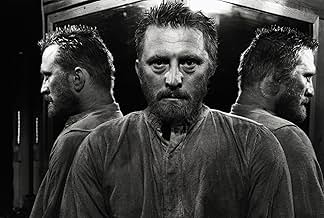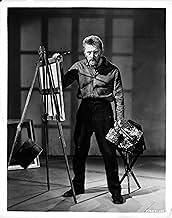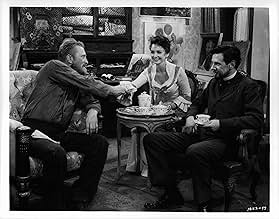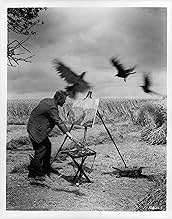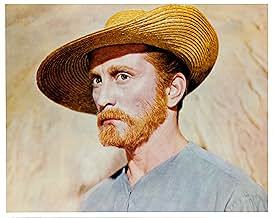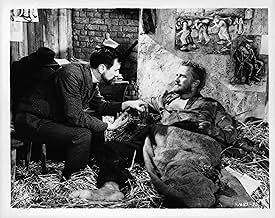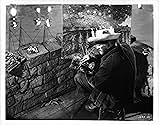CALIFICACIÓN DE IMDb
7.3/10
13 k
TU CALIFICACIÓN
La vida del brillante pero torturado artista Vincent van Gogh.La vida del brillante pero torturado artista Vincent van Gogh.La vida del brillante pero torturado artista Vincent van Gogh.
- Dirección
- Guionistas
- Elenco
- Ganó 1 premio Óscar
- 4 premios ganados y 6 nominaciones en total
- Dirección
- Guionistas
- Todo el elenco y el equipo
- Producción, taquilla y más en IMDbPro
Opiniones destacadas
This is one of my favorite films. It deeply touched me. It's in my top 20 for sure. Maybe top 10. The acting, directing, and production are all about as good as it gets. It's a shame Kirk Douglas didn't win the best actor Oscar. I think it's his finest performance. I can't think of a single bad thing to say about this great movie. It's a vivid (and accurate) tribute to the immortal Vincent.
Although I started my academic career as an art major, my interest was always in making art of my own rather than studying the works of the past masters. As a result, I wouldn't know a Manet from a Monet, but one painter whose work I can always identify is Vincent Van Gogh, perhaps the most famous example of the "tortured artist" who sought solace from the pain of life through his work. Like so many artists from different mediums, Van Gogh's life, especially the dramatic episode in which he sliced off his ear in an epileptic fit, is more famous than his work, a situation heightened, no doubt, by Don Mclean's melancholy ballad "Vincent," an improbable chart topper in 1972. Prior to being honored by the composer of "American Pie," Van Gogh's biggest brush with popular success came with Vincent Minnelli's film of Irving Stone's best-seller, an often melodramatic but still effective dramatization of the artist's troubled life. Kirk Douglas' intense portrayal of the impoverished and often fanatical Dutchman is helped immeasurably by his physical resemblance to his subject. Bearded, and with his blonde hair dyed red, Douglas could easily be mistaken for the man whose self-portraits hang on the wall of the modest bedroom where much of the film takes place. Occasionally, Douglas' clenched teeth and fist approach to drama comes through to reveal the actor behind the makeup, but his Oscar nominated performance seldom falls victim to the actor's "star" persona. Even Anthony Quinn, an actor who has given the same performance in dozens of movies, is good, but his brief turn as Paul Gaughan is hardly distinguished enough to merit the Oscar for best supporting actor. The rest of the cast is beautifully assembled with James Donald properly sympathetic as Vincent's patient, supportive brother, Theo, and no way can I complain about any film that finds room for the splendid presence of Henry Daniell, seen here as the patriarch of the Van Gogh family. The paintings, a wild riot of colorful intensity, are seen throughout (courtesy of numerous private collectors and public museums, including my hometown's Cleveland Museum of Art), and without them, "Lust for Life" would have a lot less luster.
I've seen this movie several times now, and every time with enjoyment and great appreciation.
The acting by Douglas and Quinn is truly first rate. It's a shame Douglas didn't get the best actor Oscar for which he was so deservedly nominated, but competition that year in that category was fierce. He truly makes you feel van Gogh's frightened agony, both at not being able to achieve what he wanted in his art and his fear of approaching insanity. (It ran in van Gogh's family; he knew what was coming.)
But I also enjoy the great efforts made to reproduce the scenes van Gogh painted, whether in Holland, Arles, or outside Paris. That couldn't have been easy, but if you know van Gogh's work, it really adds to the effect the movie makes.
There are times when the characters speak like an art history textbook - though those painters did love to discuss their theories on art, as you see in their letters.
Still, I consider this to be one fine movie. Whether it gives an accurate depiction of van Gogh or Gauguin is beside the point. It's based on a novel by Irving Stone, who didn't hesitate to change facts to make for a book that would sell; it's not a BBC documentary, and shouldn't be judged as such. It does a great job of showing us the torments of a great painter, and gives us some idea of what van Gogh was up to. That's more than enough for me.
The acting by Douglas and Quinn is truly first rate. It's a shame Douglas didn't get the best actor Oscar for which he was so deservedly nominated, but competition that year in that category was fierce. He truly makes you feel van Gogh's frightened agony, both at not being able to achieve what he wanted in his art and his fear of approaching insanity. (It ran in van Gogh's family; he knew what was coming.)
But I also enjoy the great efforts made to reproduce the scenes van Gogh painted, whether in Holland, Arles, or outside Paris. That couldn't have been easy, but if you know van Gogh's work, it really adds to the effect the movie makes.
There are times when the characters speak like an art history textbook - though those painters did love to discuss their theories on art, as you see in their letters.
Still, I consider this to be one fine movie. Whether it gives an accurate depiction of van Gogh or Gauguin is beside the point. It's based on a novel by Irving Stone, who didn't hesitate to change facts to make for a book that would sell; it's not a BBC documentary, and shouldn't be judged as such. It does a great job of showing us the torments of a great painter, and gives us some idea of what van Gogh was up to. That's more than enough for me.
Not only does KIRK DOUGLAS bear a remarkable resemblance to the real Vincent Van Gogh, but he gives a deeply felt, bigger than life performance in the role of a lifetime, fully deserving his Academy Award nomination.
The letterbox version on TCM doesn't do justice to the film's brilliant color photography, deliberately muted for the early coal mining scenes but crisp and clear when it comes to Van Gogh's now famous paintings. I haven't seen the DVD version, but I hope it's considerably better than the print showing on cable.
At any rate, it's tremendously well done--the entire look of the production creating the sense of time and authentic atmosphere and actually filmed on the actual location sites with an impressive cast of villagers and supporting actors. PAMELA BROWN, NIALL MacGINNIS (as The Postman), and most of all, JAMES DONALD as brother Theo, who nurtures his brother and supports him financially but is unable to sell any of his paintings--except one.
It's a fine recreation of the Irving Stone novel and Douglas immerses himself in the character of Van Gogh, much the way ANTHONY QUINN does as Gauguin. Quinn's stormy, tempestuous relationship with Douglas provides some electric moments of conflict.
The score by Miklos Rozsa accents the drama at every turn, slashing at the drama the way Van Gogh slashed at his canvas with thick brush strokes. It's starkly dramatic without ever being overbearing.
Vincent Minnelli's direction is above reproach. A finer tribute to the tormented artist could not be imagined with so many of his canvases shown on screen in impressive close-ups.
The letterbox version on TCM doesn't do justice to the film's brilliant color photography, deliberately muted for the early coal mining scenes but crisp and clear when it comes to Van Gogh's now famous paintings. I haven't seen the DVD version, but I hope it's considerably better than the print showing on cable.
At any rate, it's tremendously well done--the entire look of the production creating the sense of time and authentic atmosphere and actually filmed on the actual location sites with an impressive cast of villagers and supporting actors. PAMELA BROWN, NIALL MacGINNIS (as The Postman), and most of all, JAMES DONALD as brother Theo, who nurtures his brother and supports him financially but is unable to sell any of his paintings--except one.
It's a fine recreation of the Irving Stone novel and Douglas immerses himself in the character of Van Gogh, much the way ANTHONY QUINN does as Gauguin. Quinn's stormy, tempestuous relationship with Douglas provides some electric moments of conflict.
The score by Miklos Rozsa accents the drama at every turn, slashing at the drama the way Van Gogh slashed at his canvas with thick brush strokes. It's starkly dramatic without ever being overbearing.
Vincent Minnelli's direction is above reproach. A finer tribute to the tormented artist could not be imagined with so many of his canvases shown on screen in impressive close-ups.
When I hear the name Vincente Minnelli certain scenes pop up on my inner screeningroom: A tracking shot at the fair (Some came running), the low tracking zoom towards Douglas and Turner at the pool (Bad and the Beautiful), snowmen (Meet me in St Louis) and the agony in Douglas's face in "Lust for life"; in fact as soon as his redbearded agonized face pops up, all the other movies fade away and "Lust for life" takes over my inner screening room.
But apart from being my favorite Minnelli movie, its a movie that more than any other shows his genius in use of colors; every scene is composed in breathtaking technicolor with the deepest respect for Van Gogh's own use of color, and Douglas's acting is filled with the same agony and passion as the strokes of Van Gogh's brush. As the other great movies who uses color to its fullest (Wizard of Oz, Black Narcissus, Ten Commandments), the simularities between the director and the painter is obvious. Hence, Minnelli's struggle for "painting" the scenes with the richness of technicolor becomes an echo of Van Gogh. It also reads as a textbook in composition from Steinberg's Dead Space to Eisenstein's juxtapositions. In all, Minnelli is of great skill and uses it to the fullest.
The story, which focuses on the struggle for a new way of expression, is tame at times and the acting (apart from Douglas) seems static most of the times, but the tortured face and body of Douglas and the use of color makes this one of the greatest achievements in MGM's history and one of the best movies Minnelli ever made.
But apart from being my favorite Minnelli movie, its a movie that more than any other shows his genius in use of colors; every scene is composed in breathtaking technicolor with the deepest respect for Van Gogh's own use of color, and Douglas's acting is filled with the same agony and passion as the strokes of Van Gogh's brush. As the other great movies who uses color to its fullest (Wizard of Oz, Black Narcissus, Ten Commandments), the simularities between the director and the painter is obvious. Hence, Minnelli's struggle for "painting" the scenes with the richness of technicolor becomes an echo of Van Gogh. It also reads as a textbook in composition from Steinberg's Dead Space to Eisenstein's juxtapositions. In all, Minnelli is of great skill and uses it to the fullest.
The story, which focuses on the struggle for a new way of expression, is tame at times and the acting (apart from Douglas) seems static most of the times, but the tortured face and body of Douglas and the use of color makes this one of the greatest achievements in MGM's history and one of the best movies Minnelli ever made.
¿Sabías que…?
- TriviaMany of the locations used for filming were the actual locations Vincent van Gogh visited in his life.
- ErroresAt Arles, when Paul Gauguin is explaining his philosophy, Vincent mistakes him for Theo saying "but Theo, err Paul..." However, this is in the script. The whole point of the line is that Van Gogh views his conversation with Gauguin as nothing more than an extension of talks he's had with Theo since childhood.
- Citas
Paul Gauguin: I'm talking about women, man. Women. I like 'em fat and vicious and not too smart. Nothing spiritual either. To have to say 'I love you' would break my teeth. I don't want to be loved.
Vincent Van Gogh: You really mean that, Paul.
- ConexionesFeatured in Van Gogh: Darkness Into Light (1956)
- Bandas sonorasLa Marseillaise
(1792) (uncredited)
Written by Claude Joseph Rouget de Lisle
Played by a band in France, near the end
Selecciones populares
Inicia sesión para calificar y agrega a la lista de videos para obtener recomendaciones personalizadas
Detalles
Taquilla
- Presupuesto
- USD 3,227,000 (estimado)
- Tiempo de ejecución
- 2h 2min(122 min)
- Relación de aspecto
- 2.55 : 1
Contribuir a esta página
Sugiere una edición o agrega el contenido que falta

![Ver Trailer [OV]](https://m.media-amazon.com/images/M/MV5BNjMwYjdhMDItMDA1NC00YjJlLWFhZjctYWY5YjBlNDdiODFiXkEyXkFqcGdeQXRyYW5zY29kZS13b3JrZmxvdw@@._V1_QL75_UX500_CR0)
